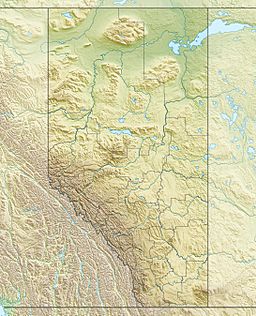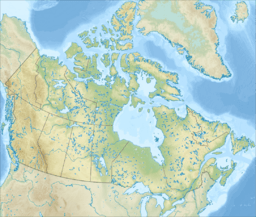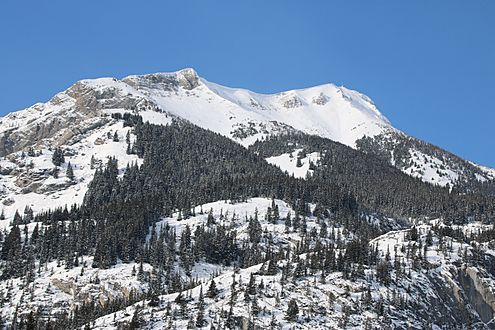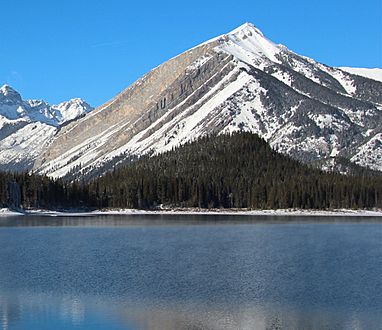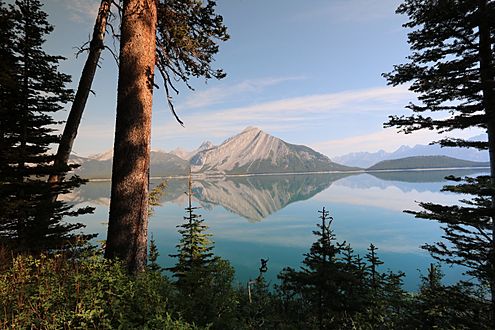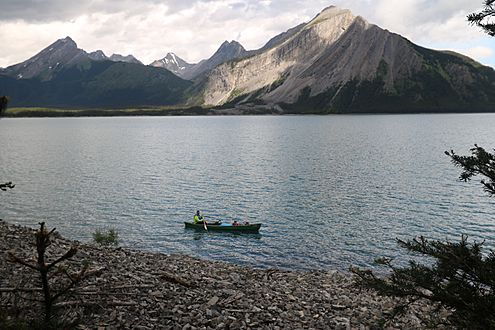Mount Indefatigable facts for kids
Quick facts for kids Mount Indefatigable |
|
|---|---|
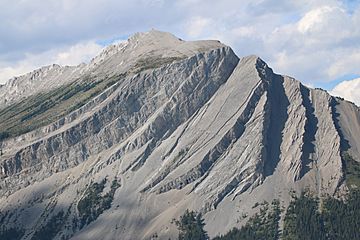
The southern aspect of Mount Indefatigable
|
|
| Highest point | |
| Elevation | 2,667 m (8,750 ft) |
| Prominence | 198 m (650 ft) |
| Parent peak | Mount Invincible (2700 m) |
| Listing | Mountains of Alberta |
| Geography | |
| Location | Alberta, Canada |
| Parent range | Spray Mountains Canadian Rockies |
| Topo map | NTS 82J/11 |
| Climbing | |
| First ascent | 1901 by Walter D. Wilcox |
| Easiest route | Scrambling |
Mount Indefatigable is a 2,667-metre (8,750-foot) mountain peak. It is found in Peter Lougheed Provincial Park in the Canadian Rockies of Alberta, Canada. You can see this impressive mountain from Alberta Highway 40 and the Kananaskis Lakes area. Mount Indefatigable is close to Mount Invincible, which is about 1.8 km (1.1 mi) to the northwest.
Many mountains in Kananaskis Country got their names from ships and people involved in the 1916 Battle of Jutland. This was a major sea battle during the First World War. Mount Indefatigable is one of these mountains.
History of Mount Indefatigable
How the Mountain Got Its Name
Mount Indefatigable was named in 1917. It was named after HMS Indefatigable, a British warship. This ship sank during the Battle of Jutland in World War I. The mountain's name was officially accepted in 1922 by the Geographical Names Board of Canada.
First Climbers of the Peak
The first person to climb to the top of Mount Indefatigable was Walter D. Wilcox. He made this first climb in 1901.
What Mount Indefatigable Is Made Of
Mount Indefatigable is made of sedimentary rock. This type of rock forms from layers of sand, mud, and tiny bits of sea creatures that settle over millions of years. These layers were laid down during the Precambrian to Jurassic periods. Later, during an event called the Laramide orogeny, these rocks were pushed up. This movement created the tall mountains we see today.
Weather Around Mount Indefatigable
Mount Indefatigable has a subarctic climate. This means it has very cold and snowy winters. The summers are usually mild. Temperatures can drop below −20 °C. With the wind, it can feel even colder, sometimes below −30 °C. Rain and melting snow from the mountain flow east into the Kananaskis River. From there, the water joins the Bow River.
Gallery
 | Madam C. J. Walker |
 | Janet Emerson Bashen |
 | Annie Turnbo Malone |
 | Maggie L. Walker |


